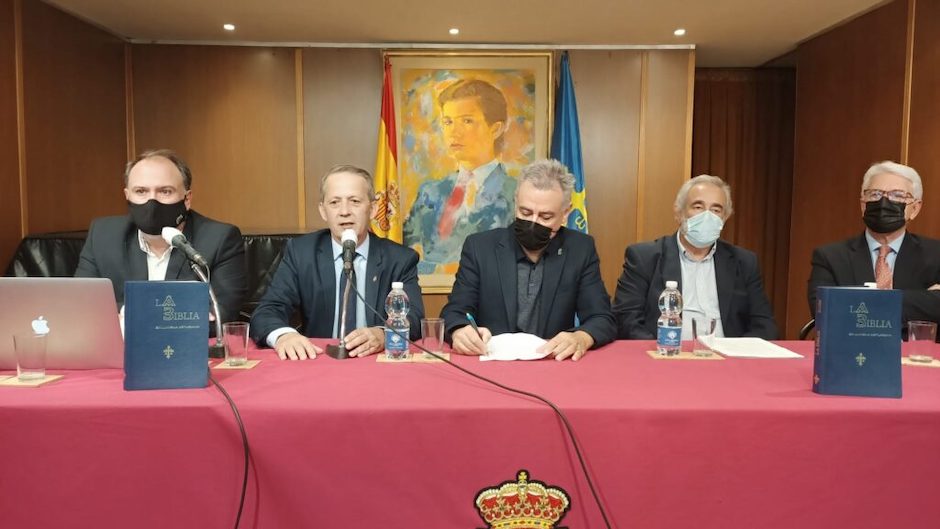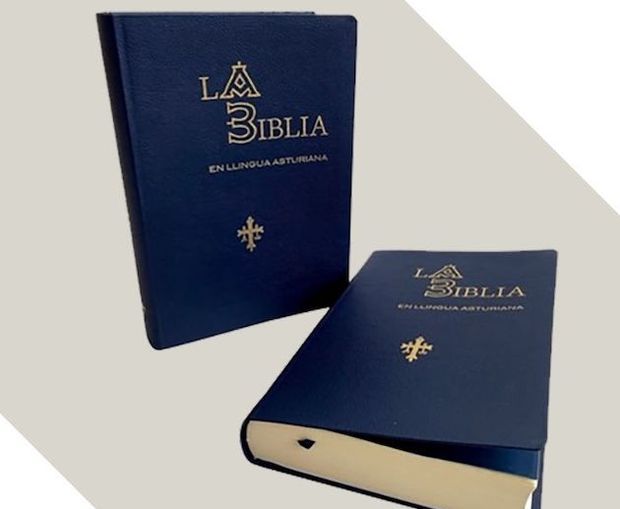Madrid hosted the presentation of the first complete Bible in the language spoken by around 200,000 people in Spain, translated from the original languages.
 Speakers during the presentation of the Asturian Bible. / Asturian Centre in Madrid.
Speakers during the presentation of the Asturian Bible. / Asturian Centre in Madrid.
The Asturian Centre in Madrid hosted the presentation of the first Bible translated into Asturian, by the Bible Society's translations department, on Thursday 28th October.
Asturian is mainly spoken in the Northern region of Asturias, but some minorities in the Spanish regions of Leon and Cantabria, as well as in Portugal, also speak the language.
According to the last official state data of 2018, around 200,000 people speak the Asturian language.
The event was opened by the President of the Asturian Centre, Valentín Martínez-Otero, who congratulated and thanked the Bible Society for all the work carried out.
He was followed by Luis Fajardo Vaquero, Director General of the Spanish Bible Society; José Luis Andavert, coordinator of the translation project of the Bible into Asturian; Ricardo Moraleja, coordinator of the translation department of the Bible Society; and Manuel Álvarez, President of the Board of Directors of the Bible Society of Spain.
They all stressed that the new Asturian Bible is the result of a translation process that has lasted more than 30 years.
The publishers were delighted that this is the first complete translation of the Bible into the Asturian language, a translation carried out by an interdenominational team of biblical scholars, linguists and theologians that began in September 1988.
In an interview with Spanish news website Protestante Digital, Moraleja explained that “more than 20 or 30 people from seminaries, universities and secondary school teachers, writers, theologians, pastors shared their knowledge as reviewers and consultants, creating a work of literary quality and religious sensitivity, with no precedent in Asturias”.

He also told that “the Asturian language is in a phase of linguistic normalisation”, so that it was difficult “to get translators and linguists to agree”.
“It was also difficult to find people with training in Asturian and Hebrew. We had to teach Hebrew to Asturian linguists, so that they could carry out the translation”, added Moraleja.
According to the coordinator of translations of the Bible Society, they hope “the Bible becomes a reference for the good use of the Asturian language. We want it to be the reference text in both the ecclesiastical and civil spheres”.
“Many call it a historic milestone. I have perceived enthusiastic reactions to having the entire Bible available in Asturian; some pastors have said so”, José Luis Fernández, one of the Asturian evangelicals who participated in the review of the text, also told Protestante Digital.
“There is an endearing reaction, not only from believers, but also from people who do not have any kind of faith, but who value having the Bible in their language, as a great legacy and a code of interpretation of Western culture”, pointed out Moraleja.
The translation is accompanied by notes that attempt to shed light on the historical, geographical, literary and cultural aspects of the text, as well as to offer other possible translation options, but without ever entering into questions of interpretation.
It also includes additional materials, such as a section of parallel references; an extensive vocabulary of the main biblical terms; a historical-literary synopsis; a table of weights, measures and coins; an outline of the Hebrew calendar; and a section of maps of the biblical lands.

Las opiniones vertidas por nuestros colaboradores se realizan a nivel personal, pudiendo coincidir o no con la postura de la dirección de Protestante Digital.
Si quieres comentar o